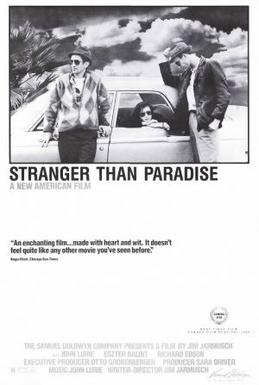The Sundance Film Festival is currently taking place in Utah so, for this week, I’m reviewing films that either premiered, won awards at, or otherwise made a splash at Sundance! Today, I take a look at 1984’s Stranger Than Paradise, which won the Special Jury Prize at the 1985 Sundance Film Festival.
‘You know it’s funny. You come to someplace new, and everything looks just the same.’
— Eddie in Stranger Than Paradise (1984)
Stranger Than Paradise tells the story of three friends.
Willie (John Lurie) lives in a small apartment in New York City’s Lower East Side. He likes to go to the movies. He likes to watch TV. He likes to gamble, putting bets on horses and cheating at poker. He was apparently born in Hungary, though he doesn’t speak with an accent and, whenever he has to deal with a relative, he always tells them, “Speak English.” When his best friend asks him about why he never mentioned that he was Hungarian, Willie replies that he’s just as American as anyone.
Eva (Eszter Balint) is Willie’s cousin. She’s travels to America from Budapest. The plan is for her to live with her Aunt Lotte (Cecillia Stark) in Cleveland but, because Lotte is in the hospital, she begins her life in America by spending ten days in Willie’s cramped apartment. Eva enjoys the music of Screamin’ Jay Hawkins. When she’s walking to Willie’s apartment, I Put A Spell On You blares from the large tape player that she always carries with her.
And then there’s Eddie (Richard Edson). Eddie may not be too smart but he’s always smiling and easy-going. Unlike the somewhat churlish Willie, Eddie always seems to be enjoying himself. When Eddie first meets Eva, most viewers will probably expect them to eventually become a couple. That doesn’t happen, of course. That’s not the type of film that this is.
The first thing you notice about Stranger Than Paradise is the look of the film. As one might expect from a film that reportedly had a budget of $10,000, the film looks cheap but there’s a beauty in that cheapness. The harsh black-and-white magnifies every detail of the film’s locations. When we watch Eva walking through New York City, the street may look desolate but it’s an exquisite desolation.
Directing his second film, Jim Jarmusch shoots nearly the entire film in single long takes and refuses to indulge in any of the usual tricks that movies often use to force an audience to identify with its main characters. The camera rarely moves and every scene ends with a blackout. It’s a technique that casts the audience as observers. Willie, Eva, and Eddie may all be outsiders but, while watching the film, so is the audience. Willie, Eva, and Eddie win us over because of the charm of the actors playing them and the deadpan humor of their dialogue but, at the same time, the film never lets us forget that we’re merely watching their lives unfold.
The humor in Stranger Than Paradise comes less from what these characters do and more from what they don’t do. When Eva arrives in New York, Willie never offers to show her around. There’s no trip to Broadway or the Statue of Liberty or anything else that we, as an audience, have been conditioned to expect whenever a stranger comes to New York for the first time. Instead, Willie and Eva sit in Willie’s apartment and watch TV. When Eddie asks Eva if she wants to join him and Willie at the movies, Willie tells Eva to stay in the apartment and not go outside. Eva eventually wins Willie over by shoplifting dinner.
During the film’s second act, Willie and Eddie decided to visit Eva in Cleveland, despite not being sure where Cleveland is. They ask one random guy standing on a street corner how to get there. “I’m waiting for a bus,” the guy snarls back. Later, as they drive drown a highway, Eddie asks Willie if they’re in Ohio yet. “I think we’re in Pennsylvania,” Willie replies. When they finally do get to Ohio, it turns out to be a frozen wasteland. After meeting up with Eva, Willie and Eddie spend most of their vacation watching TV with Lotte. Eventually, they visit Lake Erie. It’s frozen but Eva, Willie, and Eddie still dutifully stand at the railing and stare down at it while a freezing wind howls around them.
Eventually, all three of them end up in Florida. Instead of visiting Walt Disney World or Miami, they end up sitting in a cheap motel room. Eva goes to the beach, which — when shot in black-and-white — looks just as desolate as Ohio in winter. Eventually, all three of them stumble into money but that’s just a set up for the film’s final joke…
It’s a deliberately slow-moving film but it’s never less than watchable. Lurie, Edson, and Balint all give such wonderfully deadpan performances that they’re a joy to watch even when they aren’t actually doing anything. Stranger Than Paradise was Jim Jarmusch’s second film and also one of the first independent American films to receive widespread attention and acclaim. (The National Society of Film Critics named it the best film of the year.) 34 years after it was first released, the film is an idiosyncratic joy to behold and definitely one that needs to watched by anyone who loves cinema.
Previous Sundance Film Reviews:

Pingback: Sundance Film Review: sex, lies, and videotape (dir by Steven Soderbergh) | Through the Shattered Lens
Pingback: Sundance Film Review: Reservoir Dogs (dir by Quentin Tarantino) | Through the Shattered Lens
Pingback: Here’s What Won At The 2018 Sundance Film Festival! | Through the Shattered Lens
Pingback: Lisa’s Week in Review — 1/22/18 — 1/28/18 | Through the Shattered Lens
Pingback: Here’s The New Red Band Trailer For The Dead Don’t Die | Through the Shattered Lens